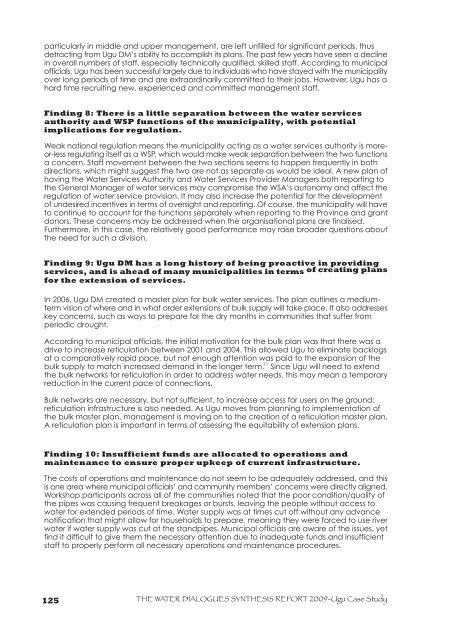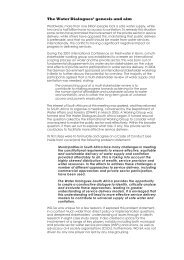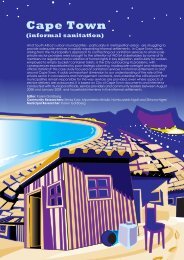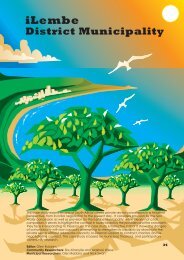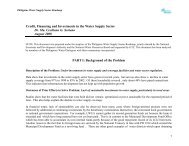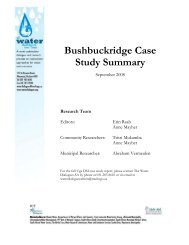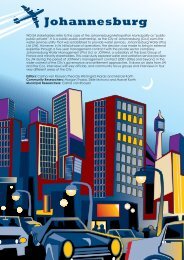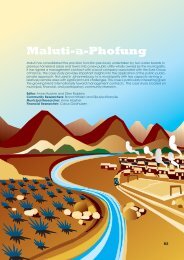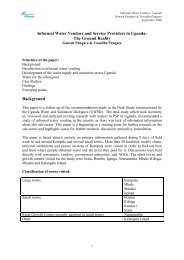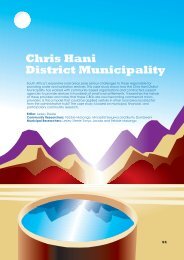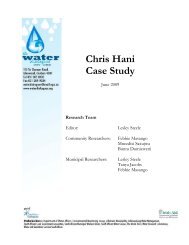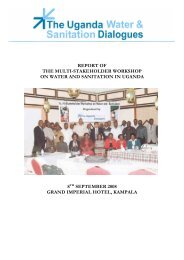Ugu Case Study Summary - The Water Dialogues
Ugu Case Study Summary - The Water Dialogues
Ugu Case Study Summary - The Water Dialogues
You also want an ePaper? Increase the reach of your titles
YUMPU automatically turns print PDFs into web optimized ePapers that Google loves.
particularly in middle and upper management, are left unfilled for significant periods, thus<br />
detracting from <strong>Ugu</strong> DM’s ability to accomplish its plans. <strong>The</strong> past few years have seen a decline<br />
in overall numbers of staff, especially technically qualified, skilled staff. According to municipal<br />
officials, <strong>Ugu</strong> has been successful largely due to individuals who have stayed with the municipality<br />
over long periods of time and are extraordinarily committed to their jobs. However, <strong>Ugu</strong> has a<br />
hard time recruiting new, experienced and committed management staff.<br />
Finding 8: <strong>The</strong>re is a little separation between the water services<br />
authority and WSP functions of the municipality, with potential<br />
implications for regulation.<br />
Weak national regulation means the municipality acting as a water services authority is moreor-less<br />
regulating itself as a WSP, which would make weak separation between the two functions<br />
a concern. Staff movement between the two sections seems to happen frequently in both<br />
directions, which might suggest the two are not as separate as would be ideal. A new plan of<br />
having the <strong>Water</strong> Services Authority and <strong>Water</strong> Services Provider Managers both reporting to<br />
the General Manager of water services may compromise the WSA’s autonomy and affect the<br />
regulation of water service provision. It may also increase the potential for the development<br />
of undesired incentives in terms of oversight and reporting. Of course, the municipality will have<br />
to continue to account for the functions separately when reporting to the Province and grant<br />
donors. <strong>The</strong>se concerns may be addressed when the organisational plans are finalised.<br />
Furthermore, in this case, the relatively good performance may raise broader questions about<br />
the need for such a division.<br />
Finding 9: <strong>Ugu</strong> DM has a long history of being proactive in providing<br />
services, and is ahead of many municipalities in terms of creating plans<br />
for the extension of services.<br />
In 2006, <strong>Ugu</strong> DM created a master plan for bulk water services. <strong>The</strong> plan outlines a mediumterm<br />
vision of where and in what order extensions of bulk supply will take place. It also addresses<br />
key concerns, such as ways to prepare for the dry months in communities that suffer from<br />
periodic drought.<br />
According to municipal officials, the initial motivation for the bulk plan was that there was a<br />
drive to increase reticulation between 2001 and 2004. This allowed <strong>Ugu</strong> to eliminate backlogs<br />
at a comparatively rapid pace, but not enough attention was paid to the expansion of the<br />
11<br />
bulk supply to match increased demand in the longer term. Since <strong>Ugu</strong> will need to extend<br />
the bulk networks for reticulation in order to address water needs, this may mean a temporary<br />
reduction in the current pace of connections.<br />
Bulk networks are necessary, but not sufficient, to increase access for users on the ground:<br />
reticulation infrastructure is also needed. As <strong>Ugu</strong> moves from planning to implementation of<br />
the bulk master plan, management is moving on to the creation of a reticulation master plan.<br />
A reticulation plan is important in terms of assessing the equitability of extension plans.<br />
Finding 10: Insufficient funds are allocated to operations and<br />
maintenance to ensure proper upkeep of current infrastructure.<br />
<strong>The</strong> costs of operations and maintenance do not seem to be adequately addressed, and this<br />
is one area where municipal officials’ and community members’ concerns were directly aligned.<br />
Workshop participants across all of the communities noted that the poor condition/quality of<br />
the pipes was causing frequent breakages or bursts, leaving the people without access to<br />
water for extended periods of time. <strong>Water</strong> supply was at times cut off without any advance<br />
notification that might allow for households to prepare, meaning they were forced to use river<br />
water if water supply was cut at the standpipes. Municipal officials are aware of the issues, yet<br />
find it difficult to give them the necessary attention due to inadequate funds and insufficient<br />
staff to properly perform all necessary operations and maintenance procedures.<br />
125<br />
THE WATER DIALOGUES SYNTHESIS REPORT 2009-<strong>Ugu</strong> <strong>Case</strong> <strong>Study</strong>


